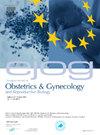Comparing urban dance and functional fitness for postmenopausal women: A randomized clinical trial protocol
IF 2.1
4区 医学
Q2 OBSTETRICS & GYNECOLOGY
European journal of obstetrics, gynecology, and reproductive biology
Pub Date : 2025-04-01
DOI:10.1016/j.ejogrb.2025.113936
引用次数: 0
Abstract
Introduction
Physical exercise is a non-pharmacological treatment that can bring positive changes to menopausal women experiencing physiological and hormonal changes leading to various physical and psychological symptoms. This study introduces the xxxxxxx Project protocol, aiming to compare the effects of Urban Dance and Functional Fitness with a control group on the physical and psychological well-being of postmenopausal women.
Methods
This study outlines a protocol for a three-arm randomized clinical trial involving two interventions (Urban Dance and Functional Fitness) lasting 12 weeks. The participants will be women in early postmenopause, aged between 40 and 59 years, assigned to three groups: (1) Urban Dance Intervention Group, (2) Functional Fitness Intervention Group, and (3) Control Group. Both interventions will consist of two weekly sessions lasting 60 min each. The outcomes to be assessed include physical aspects (body mass index, fat percentage, waist circumference, muscle strength, cardiorespiratory fitness, bone densitometry, sleep quality, urinary incontinence, sexual function, and follicle-stimulating hormone) as well as psychological aspects (stress, cognition, mood state, depressive symptoms, and anxiety). Data collection and analysis will be conducted during pre- and post-intervention periods.
Discussion
The study is proposed with the aim of expanding the evidence related to the effects of different types of physical exercise in reducing and/or stopping symptoms resulting from menopause. The hypothesis is that women who perform the types of physical exercise will significantly improve the symptoms investigated when compared to those in the control group, thus expanding the possibilities of non-pharmacological therapies to assist the work of health professionals, favoring the physical and psychological aspects of this population.
比较城市舞蹈和功能健身绝经后妇女:一项随机临床试验方案
体育锻炼是一种非药物治疗,可以给经历生理和激素变化导致各种生理和心理症状的绝经妇女带来积极的变化。本研究引入xxxxxxx项目方案,旨在比较城市舞蹈和功能健身与对照组对绝经后妇女身心健康的影响。方法:本研究概述了一项为期12周的三组随机临床试验方案,包括两项干预措施(城市舞蹈和功能健身)。研究对象为绝经前期女性,年龄在40 - 59岁之间,分为三组:(1)城市舞蹈干预组,(2)功能健身干预组,(3)对照组。两种干预措施将包括每周两次,每次持续60分钟。评估的结果包括身体方面(体重指数、脂肪百分比、腰围、肌肉力量、心肺健康、骨密度、睡眠质量、尿失禁、性功能和促卵泡激素)以及心理方面(压力、认知、情绪状态、抑郁症状和焦虑)。数据收集和分析将在干预前后进行。提出这项研究的目的是扩大与不同类型的体育锻炼在减少和/或停止更年期症状方面的作用有关的证据。假设是,与对照组相比,进行体育锻炼的妇女将显著改善所调查的症状,从而扩大非药物治疗的可能性,以协助卫生专业人员的工作,有利于这一人群的生理和心理方面。
本文章由计算机程序翻译,如有差异,请以英文原文为准。
求助全文
约1分钟内获得全文
求助全文
来源期刊
CiteScore
4.60
自引率
3.80%
发文量
898
审稿时长
8.3 weeks
期刊介绍:
The European Journal of Obstetrics & Gynecology and Reproductive Biology is the leading general clinical journal covering the continent. It publishes peer reviewed original research articles, as well as a wide range of news, book reviews, biographical, historical and educational articles and a lively correspondence section. Fields covered include obstetrics, prenatal diagnosis, maternal-fetal medicine, perinatology, general gynecology, gynecologic oncology, uro-gynecology, reproductive medicine, infertility, reproductive endocrinology, sexual medicine and reproductive ethics. The European Journal of Obstetrics & Gynecology and Reproductive Biology provides a forum for scientific and clinical professional communication in obstetrics and gynecology throughout Europe and the world.

 求助内容:
求助内容: 应助结果提醒方式:
应助结果提醒方式:


